Lamenting language loss: Where would national identity be today if Irish was still spoken in Ireland?
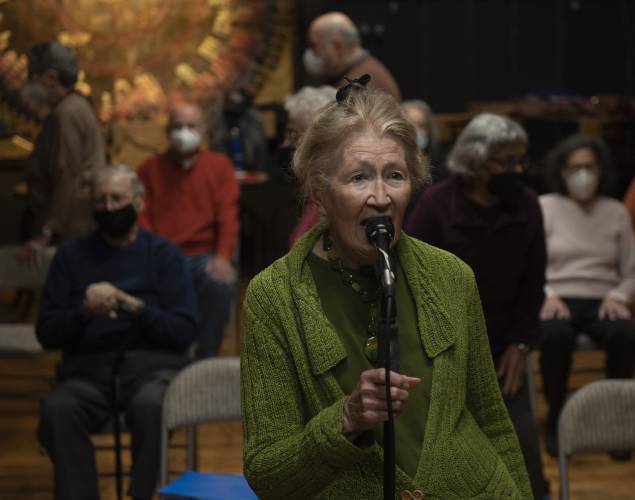
Rosemary Caine rehearsing with the Young @ Heart Chorus in 2022. “By the time I was in secondary school in the part of Ireland known as The Pale,” writes Caine, “any residue of the language was gone, or so I thought.” GAZETTE FILE PHOTO
| Published: 03-15-2024 3:25 PM |
The 2019 Green River Festival had Rhiannon Giddens as the headliner on the last Sunday afternoon.
I was intrigued by her background: a banjo player, violinist and singer, an ethnomusicologist trained in opera at Oberlin College, a charming beauty and an exponent of multi-cultural African and American musical influences; a conservatory trained genius who could take her place at the highest reaches of the performing arts; a collaborator with The Silk Road and Yo-Yo Ma and recently a simulcast presenter of Saturday Met Opera at Carnegie Hall.
When Rhiannon finished her set to a standing ovation, she casually mentioned that she lived in Limerick, Ireland.
I couldn’t wait to push my way to the top of the waiting fan line with my friend Mary Ellen Kelly, a retired English professor at Greenfield Community College. There was an informal vetting process and we were asked to step into a classroom at GCC and wait our turn.
We eventually made it to the top of the line and there was the smiling star.
I couldn’t help myself: “What is a lovely African-American girl like yourself doing in rainy Limerick?”
She laughed and said her children went to a Gael Scoil, a primary school that teaches all subjects in the Irish language. (“Through the medium” is how I remember it described.)
I was just about speechless and wished that I could have answered her in a voluble flow of the native tongue.
Article continues after...
Yesterday's Most Read Articles
Sadly, in my case, my conversational Irish is almost gone. I dared not risk it in front of the mother of two Limerick Gaelgeoirs, the Irish-speaking children of a famous musician.
Irish as a spoken language was almost entirely eliminated by the Penal Laws enacted in 1695. It was against the law to speak Irish or play Irish music. It is yet another piece of the legacy of English/Irish colonial history.
The spoken language survived only in small outposts dotted around the country in Donegal, Mayo, Meath, Waterford, parts of Kerry, Galway and Cork.
The Irish spoken on the Blasket Islands off the coast of Kerry was ancient and pure and attracted scholars from unlikely backgrounds who went there up until the 1950s to learn it, before it disappeared. Many of last Blasket Islanders ended up in Springfield. The island has been uninhabited since the 1950s.
There were, according to Robert Kanigal’s book about life and language on the Blaskets, “On An Irish Island,” 34 Irish words for “darling.”
What was lost in translation and emotional connection when the words to express life, love and longing are gone? Are the feelings lost too? How was the speaking of the outlawed Irish language policed?
It surely was: by the mid 1800s, English was widely spoken in Ireland, which was an advantage for emigrants who came from Ireland during The Famine in the mid 1840s — by then it was almost obliterated. The Irish, mad to express themselves anyway, found their literary feet in Hibernian English.
By the time I was in secondary school in the part of Ireland known as The Pale, any residue of the language was gone, or so I thought. In subsequent years, I have met native Irish speakers from the town of Dundalk, 12 miles from where I grew up in Ardee. It was an Anglicized world apart. I knew no fiddle players, no Irish dancers, no Irish language poets, no Gaelgeoirs. There was little pride in Irish culture. It had been well and truly stamped out with a deeply ingrained cultural message that it was part of a peasant past and weren’t we all so lucky to be speaking English. We had to take Irish to matriculate into College. The compulsory nature of the academic requirement resulted in a predictable increase in teenage national rebellion. We took French and Latin and in my own case I had less resistance to Latin than Irish.
Things changed when I had a summer camp experience of The Gaeltacht in Rannafast, Co Donegal, where Irish was still spoken. At 14, a school friend, Maria Regan, and I headed for three weeks to immerse ourselves in the vernacular Donegal Irish. There I met and was befriended by a life-long Irish speaker and teacher Malachy O’Rourke, a subsequent compiler of new Irish dictionaries and an updater of Irish grammar. His scholarly book on the impact of the loss of the Irish language on the Irish psyche will no doubt hit Amazon in the next year or so.
Rannafast is a stunningly beautiful and scenic part of the Donegal coast with sweeping sandy beaches, a small enclave with a school where the language survived. There, in the summer of 1959, I was Irish dancing and listening to traditional fiddling. All conversations were to be conducted in Irish. Mine wasn’t so hot and the occasional lapse into whispered English could be punished with expulsion. Conversations in English were like the Penal Laws in reverse.
Today’s Ireland is not just diverse, it has seen a resurgence of Irish language expression, especially in the arts. “An Cailín Ciúin” (“The Quiet Girl”), an award winning film in Irish, garnered international attention and acclaim. RTE, the BBC of Ireland, has an Irish language channel.
I saw in the Irish Times recently that a bunch of elderly former Rannafast Irish Language Campers like me are going back for a refresher course, beset, I imagine, with the same regret I experience myself: why didn’t we all take Irish more seriously when we were young? Then we wouldn’t have to rely on the English subtitles in “The Quiet Girl,” and maybe we’d understand the Irish rapper Knee Cap’s hip hop lyrics.
Rosemary Caine’s musical, “Margaret Maher and The Celtification of Emily Dickinson,” will be performed at The Academy of Music on March 23. Rosemary is also a member of The Young @ Heart Chorus.

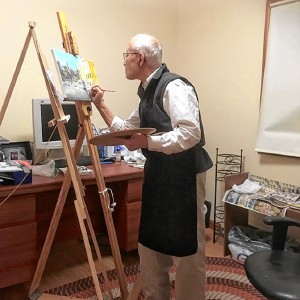 Proof that it’s never too late: Solo exhibit and free workshops honor the late Frederick Gao, a Belchertown resident who became a painter in his last five years
Proof that it’s never too late: Solo exhibit and free workshops honor the late Frederick Gao, a Belchertown resident who became a painter in his last five years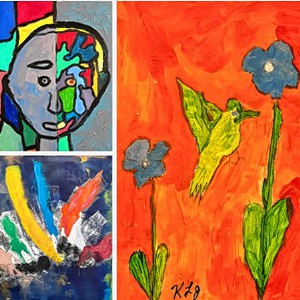 Self-expression on display: ServiceNet members’ artworks on view at Greenfield Public Library through end of May
Self-expression on display: ServiceNet members’ artworks on view at Greenfield Public Library through end of May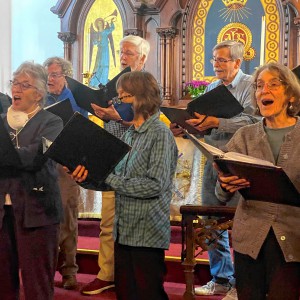 Embracing both new and old: Da Camera Singers celebrates 50 years in the best way they know how
Embracing both new and old: Da Camera Singers celebrates 50 years in the best way they know how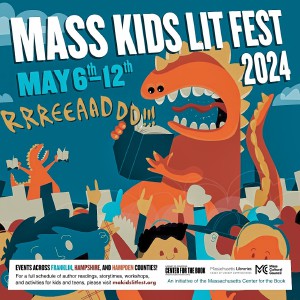 Time to celebrate kids and books: Mass Kids Lit Fest offers a wealth of programs in Valley during Children’s Book Week
Time to celebrate kids and books: Mass Kids Lit Fest offers a wealth of programs in Valley during Children’s Book Week
